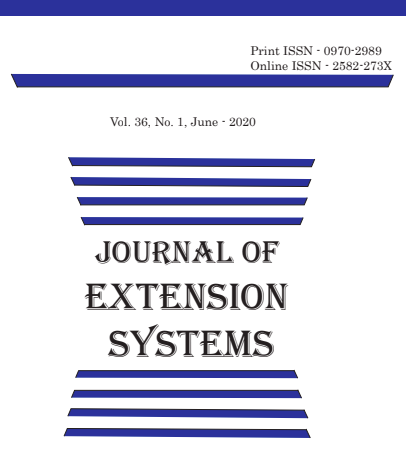Perceived Effects of Social Capital on Households’ Welfare During Crisis in Ondo State: Evidence From COVID-19 Pandemic
DOI:
https://doi.org/10.48165/jes.2022.38.2.5Keywords:
social capital, households’ welfare, access to resourcesAbstract
This study assessed the perceived effects of social capital on households’ welfare during crises, using the COVID-19 pandemic in Ondo State as case study. A two-stage sampling approach was applied to gather data from 120 households via interview schedules. Data on socio-economic characteristics, group membership, reasons for joining associations, welfare services accessed during the crisis, and the perceived effects of social capital were analyzed using descriptive statistics, chi-square tests and PPMC. Results showed that most respondents were female, married (93.3%), and in their productive years (mean age of 50), with 98.3% having formal education. A large majority (86.7%) belonged to at least one association; mainly cooperative societies (53.3%) and religious groups (20.8%), joining primarily to improve household welfare (ⴟ = 5.50), benefit their community (ⴟ = 3.42), and increase income (ⴟ = 2.67). During the pandemic, 59.2% received support from their associations, with credit/loans (ⴟ = 4.17), food supplies (ⴟ = 3.42), information (ⴟ = 3.33), and hand sanitizer (ⴟ = 3.00) being most accessed. The most valued effects of social capital were access to information (ⴟ = 3.82), provision of sanitizer (ⴟ = 3.74), and financial assistance (ⴟ = 3.68). Chi-square results indicated significant relationships between age, education, household size, occupation, and coping strategies (p < 0.05). The PPMC result (r = 0.530, p = 0.033) confirmed a significant relationship between welfare services accessed and perceived effects of social capital. The study concludes that social capital positively influenced welfare during COVID-19 and recommends promoting strong social networks through targeted awareness initiatives.
Downloads
References
Abdulkareem, H. K. K., Jimoh, S. O., & Shasi, O. M. (2023). Socio-economic development and sustainable development in Nigeria: The roles of poverty reduction and social inclusion. Journal of Business and Socio-economic Development, 3(3), 265–278. https://doi.org/10.1108/JBSED-10-2021-0137
Achida, M. B., Garba, T., & Abdullahi, Y. Z. (2023). Does Social Capital Determine Household Welfare? An Investigation into the Situation in Sokoto Metropolis. Journal of Economics and Sustainable Development, 14(8), 4–15.
Adepoju, B., & Oni, O. (2022). Investigating Endogeneity Effects of Social Capital on Household Welfare in Nigeria: A Control Function Approach. Quarterly Journal of International Agriculture, 51(1), 73–96.
Adesina, O. S., Ojo, A. F., & Fasoranti, M. M. (2021). Impact of Cooperative Societies on Household Welfare in Nigeria. Journal of African Development Studies, 23(2), 67–85.
Afolabi, C. Y., & Olatayo, S. A. (2021). COVID-19 Pandemic, Livelihood and Coping Strategies in Nigeria. International Journal of Health and Psychology Research, 9(3), 45–70.
Afolayan, A. O., & Ojo, O. (2019). Social Capital and Household Welfare in Nigeria. Journal of African Development Studies, 21(3), 45–58.
Agwu, P., & Okoye, U. (2021). Social work and COVID-19: A gap in Nigeria’s intervention. International Social Work, 64(5), 761–770.
Idiaye, C. O., Kuhn, A., Adepoju, A. O., Rahji, M. A. Y., & Okoruwa, V. O. (2021). Labour Market Participation and Rural Household Welfare in Nigeria. Ibadan Journal of Agricultural Research, 17, 60–71.
Nwagbara, O. M., Ukeje, C. I., & Nwankwo, J. I. (2022). The Role of Community-Based Organizations in Social Cohesion and Well-being. International Journal of Social Sciences, 30(4), 75–92.
Ogundari, K., & Aromolaran, A. B. (2014). Impact of Education on Household Welfare in Nigeria. International Economic Journal, 28(2), 345–364. https://doi.org/10.1080/10168737.2013.811279
Shiaki, T. K., Almakura, F. A., Gambo, N., & Abubakar, H. L. (2024). Impact of Social Capital on Poverty Reduction in Benue State Nigeria. International Journal of Small Business and Entrepreneurship Research, 12(1), 60–82. https://doi.org/10.37745/ijsber.2013/vol12n126082
Suleiman, M. (2020). Impact of COVID-19 on Nigeria’s Economy. Voice of Nigeria. Retrieved from https://von.gov.ng/impact-of-covid-19-on-nigerias-economy/
Ufua, D. E., Osabuohien, E., Ogbari, M. E., Falola, H. O., Okoh, E. E., & Lakhani, A. (2021). Re-Strategising Government Palliative Support Systems in Tackling the Challenges of COVID-19 Lockdown in Lagos State, Nigeria. Global Journal of Flexible Systems Management, 22(1), 19–32.
World Bank. (2020). COVID-19 and Welfare in Nigeria: New Evidence for Policy. World Bank Poverty Team. Retrieved from https://pubdocs.worldbank.org/en/961791611161231868/pdf/COVID-19-and-Welfare-in-Nigeria-New-Evidence-for-Policy-October-2020.pdf
Published
Issue
Section
License
Copyright (c) 2025 Journal of Extension Systems

This work is licensed under a Creative Commons Attribution-NonCommercial-NoDerivatives 4.0 International License.

